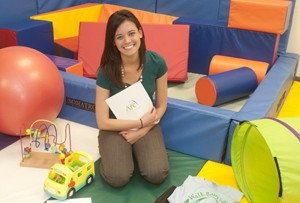
Kristy Anderson puts people at the center of her work, both in and out of the classroom.
“I approach my research with a person-centered philosophy,” says Anderson, a master’s of social work candidate from the Brown School at Washington University in St. Louis.
“I’m focused on services for people with disabilities, but from a person-first perspective. Person-centered is allowing the person with a disability to govern their own lives and goals. We are simply there to help them through the process.”
Anderson’s interest in working with people with disabilities began while she was earning an undergraduate degree at Truman State University in Kirksville, Mo.
“I originally planned on studying psychology and marketing, but after volunteering at a camp for kids with disabilities, I changed course,” she says. “I was a camp counselor and job coach for teens with disabilities. I helped teach them different job skills.
“It took me three months to teach a young man with autism how to fold his own pants. When he finally did it on his own, I knew I helped his independence and his quality of life,” she says.
“This meant more to me than what I was studying in my psychology classes. It was more tangible and real.”
Anderson worked at Specialized Support Services in Kirksville, a group home for people with disabilities, and, after earning her bachelor’s degree, stayed in Kirksville to become a transition coordinator for Learning Opportunities, Quality Works.
“It was a very humbling experience,” she says. “While working, I realized systems were not in place to help people with developmental disabilities.”
This prompted Anderson, a native of suburban Chicago, Ill., to go back to school for a degree in social work.
“I chose the Brown School because you can individualize your curriculum and take advantage of the school’s evidence-based approach to research and teaching,” she says.
“I pursued a specialization in research so I can use social work research to influence the way service providers are carrying out services. From a policy standpoint, there needs to be an evidence-base that supports these changes.”
While at the Brown School, she worked at the St. Louis Arc for her foundation practicum studies. Anderson helped to evaluate the agency’s programs.
“I really enjoyed working at the Arc,” she says. “People are at the heart of their work.”
After completing her practicum, Anderson returned to the Arc to finish her original research project.
She analyzed satisfaction surveys completed by people with developmental disabilities, conducted focus groups and developed an evaluation survey for the Arc’s residential program.
Anderson administered the survey and quickly analyzed the data to benefit the people supported by the Arc.
“This project is of great benefit to the agency not only because of the data it provides, but because she has developed it in a way that we can use it in the future,” says Mark A. Keeley, vice-president of support services for the St. Louis Arc.
“Kristy is, by far, the best of all the students I have had the pleasure of supervising. Her leadership, initiative, advanced skills and commitment to social work principles are far superior to her peers.”
Anderson continues to volunteer with the St. Louis Arc’s Sibshop program, a recreational support group for young siblings of people with developmental disabilities.
While working in the field, Anderson continued expanding her research and policy focus.
She has worked as a research assistant for Paul Shattuck, PhD, assistant professor at the Brown School, on his National Institute of Mental Health-funded project examining patterns of service use and related outcomes among teens and young adults with autism.
“Kristy’s abilities were immediately apparent,” Shattuck says. “Her aptitude for research methods made her a quick study. She quickly became a key member of my research team.
“Beyond her intellectual abilities, Kristy’s work ethic is unmatched. She is also extremely positive, upbeat, engaging and a fun person with whom to work.”
Anderson says that Keeley and Shattuck helped give her the confidence to pursue a doctorate. She will begin a PhD program at the University of Wisconsin at Madison in the fall.
“I want to teach – I want to help other students the way that Paul has helped me,” she says.
Anderson also hopes to pave the way for a clearer home for disability research in social work, particularly developmental disabilities.
Anderson’s career path has taken her in a decidedly different direction than the rest of her family.
“My sisters are consultants, so I offer a break from all the business talk around the table,” she laughs.